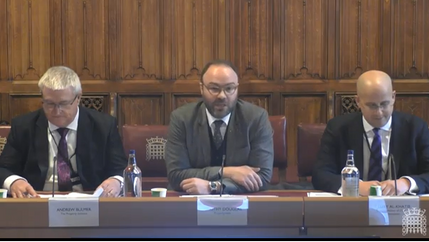
Universal support for Regulation of Property Agents
Douglas and the other members of the panel all spoke strongly in support of regulation as an essential step towards improving the buying and selling process and also to contribute to the implementation of other measures including renters and leasehold reform.
Without effective regulation, consumers have little guarantee that an agent will provide a quality service, especially if the agent has not signed up to higher standards through voluntary professional bodies.
Setting minimum qualification requirements to enter the industry, and mandating continuing professional development for practising agents, will ensure that new entrants have the appropriate knowledge to carry out the home buying and selling process effectively and maintain up-to-date skills throughout their career.
Additionally, through a universal Code of Practice and effective redress, poor-quality services can be gradually erased from the sector.
Listen to the LUHCC session on parliamentlive.tv →
Evidence from the front line
Propertymark’s response to the call for evidence is firmly rooted in evidence gathered for our April 2024 position paper, The Future of Home Buying and Selling. This paper was informed by member discussion groups which explored issues with the current process and potential solutions.
Despite its importance, and notwithstanding the number of transactions taking place each year, home buying and selling in the UK is outdated and inefficient, having seen little improvement over the past few decades.
Compared to countries like Australia, Norway and the USA, our process is slow, with a high proportion of fall-throughs. This isn't just a minor annoyance; failed transactions cost consumers £260 million annually . Within the industry, estate agents and conveyancers also lose £1 billion, and around 4 million working days annually.
Set the standard
Many Propertymark members have stated legal and conveyancing firms operate differently and have different expectations of an agent when working with them.
This leads to significant variation in how a property sale is carried out, leading to inefficiencies that slow a transaction down and can ultimately cause fall-throughs.
Joint guidance covering property agents, conveyancers, lenders, and any other stakeholders involved in the process, will help to improve this by setting clear roles and expectations and improving coordination between organisations.
The revolution must be digitised
The property sector remains overwhelmingly paper-based (with the average transaction generating 130 documents) and with very little automation in place. Data is often fragmented, and difficult to access, creating unnecessary, time-consuming procedures.
Promoting services to enable all parties to work on documents together and be able to access them in real-time will help permit organisations to collaborate more effectively during the process.
Key aspects of the work of the Digital Property Market Steering Group, of which Propertymark is a founding member, include developing an action list to remove paper-based processes and see rapid adoption of digital ID and secure e-signatures; a research and development roadmap; and a charter detailing roles and responsibilities across the sector to generate up front information.









